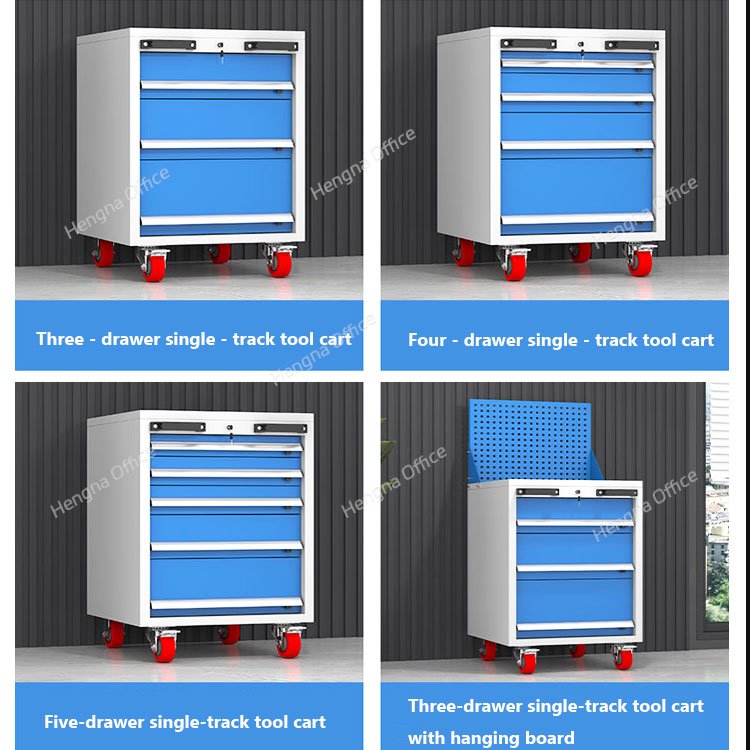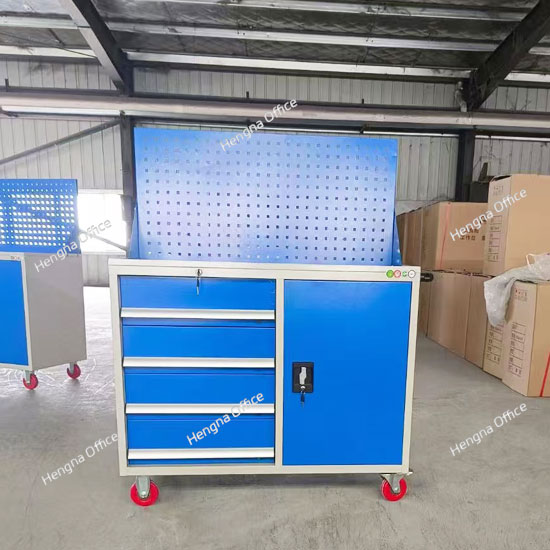OEM vs Standard Tool Carts: Why B2B Buyers Trust Customizable Solutions
Tool organization plays a crucial role in workplace productivity. B2B buyers face a critical decision when selecting equipment. They must choose between OEM and standard tool carts. This choice impacts operational efficiency significantly. OEM vs Standard Tool Carts represents more than just a purchasing decision. It reflects a company’s approach to workflow optimization. Customizable solutions have gained prominence among discerning B2B buyers. These tailored options address specific operational needs. Understanding the differences between OEM and standard tool carts helps businesses make informed decisions.
What Are OEM Tool Carts?
OEM tool carts are custom-designed storage solutions. Original Equipment Manufacturers create these specialized units. They are built to precise specifications. OEM tool carts address unique operational requirements. These carts integrate seamlessly with existing workflows. Customizable solutions from OEM providers offer distinct advantages. They can incorporate specific materials, dimensions, and features. OEM tool carts often include specialized compartments and ergonomic designs. B2B buyers appreciate the precision engineering involved. When comparing OEM vs Standard Tool Carts, the customization factor stands out. OEM solutions represent a strategic investment in operational efficiency.

Standard Tool Carts: The Conventional Approach
Standard tool carts are mass-produced storage units. They come in predetermined sizes and configurations. These carts serve general purposes across various industries. Standard tool carts offer immediate availability and lower upfront costs. They provide basic functionality for common tool storage needs. However, they lack the specialized features of OEM solutions. B2B buyers often find limitations with standard options. The one-size-fits-all approach rarely optimizes specific workflows. When examining OEM vs Standard Tool Carts, standard options may seem economical initially. Yet, they often require workarounds and adaptations. Customizable solutions typically outperform standard alternatives in specialized environments.
Key Differences Between OEM and Standard Tool Carts:
| Feature | OEM Tool Carts | Standard Tool Carts |
|---|---|---|
| Customization | Fully customizable to specifications | Limited to available models |
| Lead Time | Longer production time | Immediate availability |
| Cost | Higher initial investment | Lower upfront cost |
| Integration | Designed for specific workflows | Generic fit for various applications |
| Scalability | Can be designed for future expansion | Fixed capacity and features |
Why B2B Buyers Prefer Customizable Solutions
B2B buyers increasingly trust customizable solutions for good reasons. Customizable solutions address specific operational challenges. They eliminate the need for costly modifications later. OEM tool carts can be designed for unique spatial constraints. They accommodate specialized tools and equipment seamlessly. Customizable solutions enhance workplace safety through ergonomic design. They reduce worker fatigue and increase productivity. When considering OEM vs Standard Tool Carts, B2B buyers recognize long-term value. Customizable solutions often provide better return on investment. They reduce operational inefficiencies and minimize downtime. B2B buyers understand that specialized needs require specialized solutions.
Top Reasons B2B Buyers Choose OEM Solutions:
- Perfect Fit: Designed for specific tools and workflows
- Enhanced Productivity: Optimized for operational efficiency
- Safety Compliance: Meets industry-specific safety standards
- Brand Integration: Can incorporate company branding and colors
- Future-Proofing: Designed to accommodate future equipment changes
The Long-Term Value of OEM Solutions
When evaluating OEM vs Standard Tool Carts, long-term value matters. OEM tool carts typically offer superior durability. They are built with higher quality materials and construction. Customizable solutions withstand demanding industrial environments. They require less frequent replacement and maintenance. B2B buyers consider total cost of ownership, not just purchase price. OEM solutions often prove more economical over their lifespan. Customizable solutions reduce workplace injuries through better design. They improve employee satisfaction and retention. When B2B buyers analyze OEM vs Standard Tool Carts, the lifetime benefits become clear. Customizable solutions represent a strategic business investment.
Industry-Specific Applications of Customizable Solutions
Different industries have unique tool storage requirements. OEM tool carts excel in specialized applications. Medical facilities need carts that meet strict hygiene standards. Manufacturing plants require carts that integrate with assembly lines. Automotive shops need solutions for specialized tools and equipment. Customizable solutions address these specific needs effectively. B2B buyers in specialized industries particularly value OEM options. When comparing OEM vs Standard Tool Carts, industry fit becomes crucial. Customizable solutions can incorporate industry-specific features. They ensure compliance with regulatory requirements. B2B buyers trust OEM solutions to meet their unique industry challenges.
Industry Applications for OEM Tool Carts:
| Industry | Specialized Requirements | OEM Solution Benefits |
|---|---|---|
| Healthcare | Sanitary design, easy cleaning | Antimicrobial materials, seamless surfaces |
| Manufacturing | Integration with production lines | Custom dimensions, specialized compartments |
| Automotive | Heavy-duty construction, tool organization | Reinforced frames, custom tool holders |
| Aerospace | Precision tool storage, security | Locking mechanisms, foam-lined drawers |
| Electronics | ESD protection, component organization | Conductive materials, static-safe design |
The Decision Process: OEM vs Standard Tool Carts
B2B buyers follow a structured decision-making process. They assess their specific operational needs first. They consider tool types, usage patterns, and workspace constraints. Budget constraints factor into the OEM vs Standard Tool Carts evaluation. However, savvy B2B buyers look beyond initial costs. They calculate total cost of ownership and potential productivity gains. Customizable solutions often justify their higher price through improved efficiency. B2B buyers also consider vendor reliability and support services. They seek partners who understand their industry challenges. When evaluating OEM vs Standard Tool Carts, thorough analysis leads to better decisions.
Success Stories: B2B Buyers Who Chose Customizable Solutions
Many B2B buyers have transformed their operations with OEM tool carts. A major automotive manufacturer reduced tool retrieval time by 40%. They achieved this through customized cart designs. A medical equipment provider improved compliance with sanitation standards. Their OEM carts featured specialized materials and easy-clean surfaces. A precision engineering firm enhanced workplace safety significantly. Their custom carts included ergonomic features and secure storage. These success stories demonstrate why B2B buyers trust customizable solutions. When examining OEM vs Standard Tool Carts, real-world results speak volumes. Customizable solutions deliver measurable improvements across various metrics.

Future Trends in Customizable Solutions
The landscape of OEM vs Standard Tool Carts continues to evolve. Smart technology integration is becoming standard in customizable solutions. IoT-enabled carts provide real-time inventory tracking. Mobile app connectivity enhances functionality and user experience. Sustainable materials are increasingly important to B2B buyers. Customizable solutions now often feature eco-friendly components. Modular designs allow for easy reconfiguration as needs change. These innovations make OEM tool carts even more valuable. B2B buyers appreciate these forward-thinking features. When considering OEM vs Standard Tool Carts, future-proofing becomes a key factor. Customizable solutions continue to advance with technology and market demands.
Conclusion: The Strategic Choice for B2B Buyers
The decision between OEM and Standard Tool Carts has significant implications. B2B buyers increasingly recognize the value of customizable solutions. OEM tool carts offer precision engineering and tailored functionality. They address specific operational challenges effectively. While standard options may seem economical initially, they often fall short. Customizable solutions provide better long-term value and performance. B2B buyers trust OEM options to enhance productivity and safety. When evaluating OEM vs Standard Tool Carts, the strategic benefits become clear. Customizable solutions represent an investment in operational excellence. For B2B buyers seeking competitive advantage, OEM tool carts deliver superior results. The choice is clear for businesses prioritizing efficiency and specialization.
